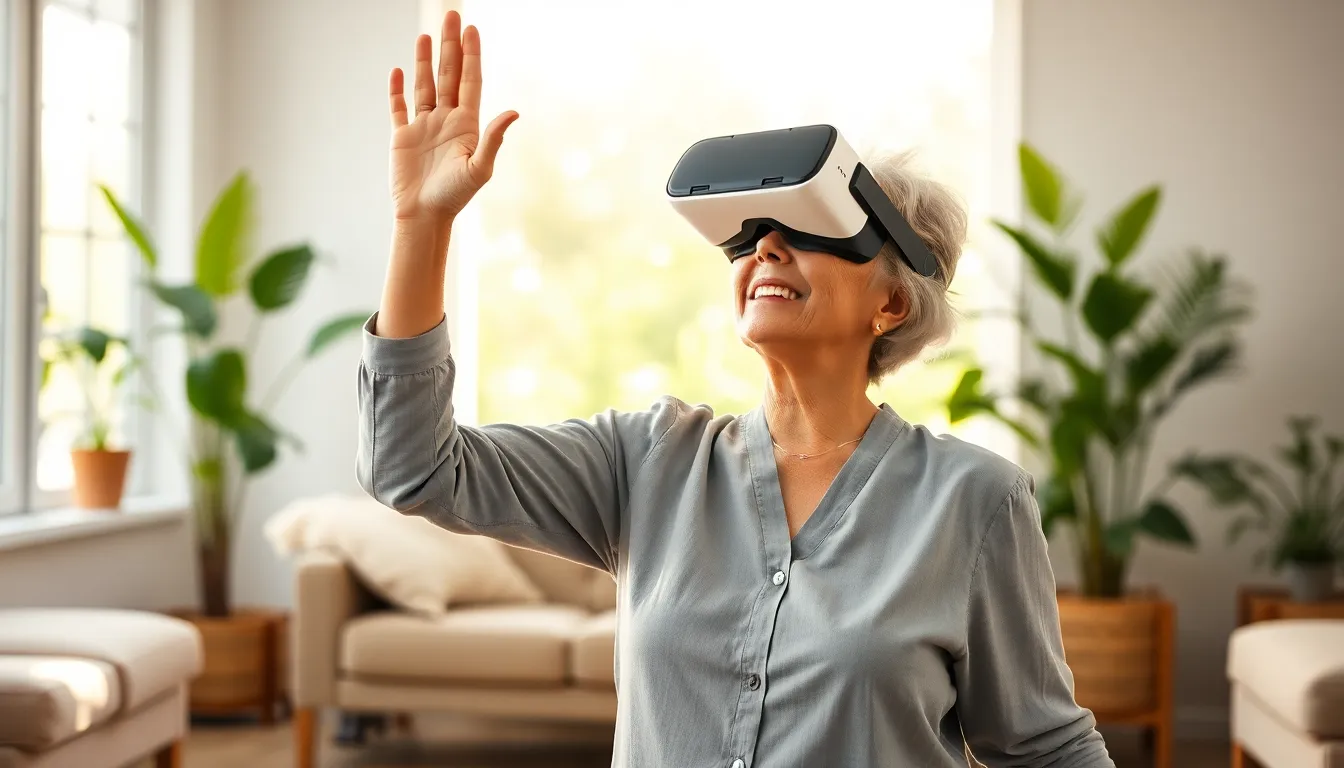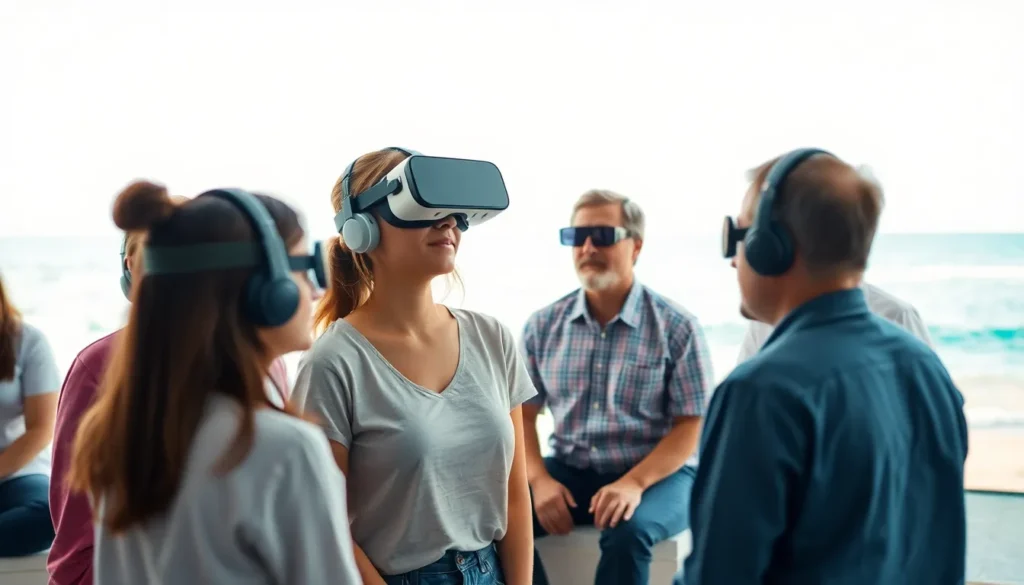Imagine taking Grandma on a virtual trip to the Eiffel Tower without the hassle of airport security or worrying about her forgetting her reading glasses. Virtual reality (VR) is breaking down barriers and opening up a world of experiences for seniors that are as exciting as they are accessible.
Table of Contents
ToggleOverview of VR Experiences for Seniors
VR experiences provide seniors with opportunities to engage in various activities that enhance their well-being. Many seniors find enjoyment in virtual travel experiences, such as visiting landmarks like the Eiffel Tower or exploring natural wonders like the Grand Canyon. Immersive environments transport older adults to places they may not physically visit, addressing mobility challenges that often accompany aging.
Seniors can also participate in socially interactive VR games that promote connection with family and friends. These games encourage interaction and foster friendships, combating feelings of loneliness prevalent in this demographic. Many platforms offer multiplayer experiences where seniors can engage in activities together, bridging the gap between generations.
Additionally, VR can support cognitive development through educational apps designed for older adults. Various programs focus on memory enhancement, problem-solving skills, and mental agility, keeping seniors mentally active and challenged. Research indicates that engaging with these experiences can lead to improved cognitive function in older adults.
Health and wellness applications in VR are also noteworthy. Many programs focus on mindfulness, relaxation techniques, or guided meditations tailored specifically for seniors. Studies show that using these applications can reduce stress levels and improve overall mental health.
Finally, VR experiences are becoming more user-friendly. Developers prioritize accessibility, ensuring that interfaces accommodate varying levels of technological comfort among seniors. With ongoing advancements in VR technology, older adults increasingly enjoy an array of experiences that promote engagement, socialization, and overall quality of life.
Benefits of VR for Seniors

Virtual reality offers numerous benefits specifically designed for seniors, enriching their lives and enhancing their well-being. It creates avenues for immersive experiences and fosters social connections.
Enhancing Cognitive Function
VR enhances cognitive function by engaging seniors in stimulating activities. Educational apps focus on memory enhancement, often incorporating fun games that challenge the mind. Problem-solving simulations present realistic scenarios that require critical thinking. Research indicates that consistent engagement in such activities can improve cognitive abilities, keeping the brain active and healthy. Seniors also showcase increased motivation when using engaging content, leading to better outcomes in mental agility.
Promoting Physical Activity
VR promotes physical activity by encouraging movement in a fun and engaging way. Interactive games require seniors to participate in light exercises that improve balance and coordination. Options like virtual yoga or guided walks in picturesque environments provide enjoyable moments of activity. Studies show these experiences can significantly reduce sedentary behavior, which is crucial for overall health. Additionally, seniors find that immersive environments motivate them to move without feeling the burdens of physical limitations.
Popular VR Experiences for Seniors
Virtual reality offers an array of engaging experiences tailored specifically for seniors. These experiences not only entertain but also enrich their lives and support their well-being.
Virtual Travel Adventures
Virtual travel adventures allow seniors to explore iconic landmarks and breathtaking sceneries from the comfort of their homes. Experiences like a tour of the Eiffel Tower or a stroll through the Grand Canyon enable them to satisfy their wanderlust without mobility concerns. Platforms provide immersive environments that cater to varied interests, ensuring each adventure feels authentic. Virtual tours can be guided or self-paced, promoting both education and enjoyment. Seniors can connect with family while sharing these experiences, creating lasting memories together.
Interactive Games and Puzzles
Interactive games and puzzles present a fun way for seniors to engage their minds. These activities support cognitive development through engaging challenges that test memory and problem-solving skills. Multiplayer options enhance social interaction, bridging generational gaps as families play together. Games designed specifically for older adults emphasize ease of use to accommodate different comfort levels with technology. Encouraging light physical activity, some games involve movement, which aids in balance and coordination. Overall, these interactive experiences transform gaming into a beneficial pursuit that brings joy and mental stimulation.
Accessibility Considerations
Accessibility features play a crucial role in making virtual reality enjoyable for seniors. They enhance usability and invite engagement with VR experiences.
User-Friendly Interfaces
Simple design makes navigation easier for older adults. Large buttons and clear icons help minimize confusion while using VR headsets. Touch-friendly interfaces cater to seniors with limited dexterity. Voice commands also empower users to interact without complicated controls. Moreover, tutorials can guide new users through initial setups, ensuring a smoother experience. Developers are increasingly focusing on intuitive navigation, recognizing that a straightforward interface helps maximize enjoyment.
Affordability and Availability
Affordable options for VR headsets and experiences are growing. Various manufacturers now offer budget-friendly devices tailored for seniors. Many VR applications designed for older adults are available through subscription services at low monthly rates. Local community centers and libraries often provide access to VR setups, making experiences easier to access. Furthermore, grants and funding opportunities help organizations leverage VR technology for senior programs. Increased availability can enhance participation in health and wellness activities, ultimately improving quality of life.
Future Trends in VR for Seniors
Developers increasingly focus on creating more immersive VR experiences designed for seniors. Enhanced graphics and realistic environments lead to deeper engagement. Adaptive technology personalizes experiences, catering to individual preferences and needs.
Innovations in hardware are making devices lighter and more comfortable. Companies prioritize ergonomics by designing headsets with adjustable bands that alleviate pressure. Furthermore, voice recognition technology helps users navigate easily, fostering independence.
Social connectivity remains a major trend, with platforms enhancing multiplayer features. Seniors can interact with family and friends in shared virtual spaces. These dynamic settings reduce isolation, promoting mental well-being.
Health-focused applications gain traction, integrating wellness and fitness routines into VR. Seniors engage in virtual exercise classes tailored to their abilities. Emerging data reveals that these activities enhance strength and flexibility, directly impacting their health.
Accessibility remains central to future developments. Manufacturers apply input from seniors to improve user interfaces. Simple designs, including larger text and intuitive navigation, empower older adults to explore VR confidently.
Collaborations with healthcare providers are on the rise. Medical professionals recognize the therapeutic potential of VR for therapy and rehabilitation. Virtual therapy sessions and guided mindfulness experiences are becoming more common, supporting mental health initiatives.
Affordable options are continuously surfacing, opening doors for more widespread adoption. Community programs frequently offer access to VR resources, bridging the technology gap. Grants and initiatives help facilities implement VR tech, ensuring that more seniors reap the benefits.
Overall, trends indicate a promising future for VR in enriching the lives of seniors. Continued innovation and focused development stand to enhance accessibility, engagement, and overall quality of life.
Virtual reality is transforming the way seniors experience life. By offering immersive adventures and interactive social opportunities, VR is not just a tool for entertainment but a means to enhance overall well-being. As technology continues to evolve, the accessibility and affordability of VR will only improve, making it easier for older adults to engage with the world around them.
The potential for cognitive and physical benefits through VR cannot be overstated. With a focus on user-friendly design and community support, seniors can look forward to a future where virtual experiences enrich their lives. Embracing this innovative technology opens doors to new adventures, connections, and healthier lifestyles, proving that age is no barrier to exploration and joy.





